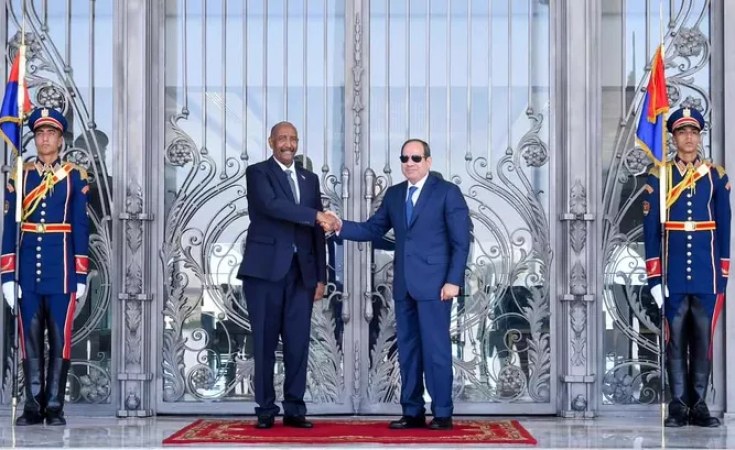Cairo — Sudan's military commander and head of the interim council that is officially running the country, Gen. Abdel Fattah al-Burhan, arrived in the Egyptian coastal town of el- Alamein Monday to meet with Egyptian President Abdel Fattah el-Sissi. It is his first official trip outside Sudan since the outset of the country's bloody conflict, which began in April.
The conflict pits Sudan's army against the country's paramilitary Rapid Support Forces.
Burhan was welcomed as a visiting head of state by Sissi Monday since he emerged from hiding in or around the capital, Khartoum, several days ago and made a quick exit to the Red Sea port city of Port Sudan.
Burhan insisted at a press conference following his talks with Sissi that the Sudanese military has no desire to hold on to power unilaterally and that his main goal is to put an end to the 4-month-old military conflict, as quickly as possible.
He said that the Sudanese armed forces are a national army and, as such, they no desire to continue to run the country indefinitely. He added that he wants to reassure Sudan's neighbors and the Sudanese people that he is trying to end the war and to complete the country's democratic transition so the Sudanese people can choose their own leaders through free and fair elections.
Despite Burhan's seemingly optimistic message, reports from the Sudanese capital and other parts of the country suggest that the conflict may be intensifying. Saudi-owned al-Arabiya TV showed live video from Khartoum showing plumes of black smoke rising from the industrial sector of the capital's twin city of Omdurman.
The French news agency also reported that more than two dozen people were killed in an attack in the city of Niala in Sudan's western Darfur region.
Egyptian political sociologist Said Sadek told VOA that Egypt's Sissi met Burhan at the airport in el-Alamein to "reaffirm that he is Sudan's legitimate leader," despite the conflict. He also stressed that Egypt is trying to end the conflict "as quickly as possible," to "prevent more bloodshed that could provoke an endless series of revenge attacks in the future."
Sadek insisted that Egypt's own national security is at stake because of the Sudanese conflict and that it is imperative to stop the conflict before it gets worse.
"Egypt is surrounded by failed states -- in Libya, in Sudan and in Gaza, and so Egypt has a national interest that there is stability and there is a central government in Sudan because [the common border] is 1,000 kilometers," Sadek said. "So, if the central government in Sudan collapses, it means more separatist movements and secessionist groups would emerge that would also have an impact on Egypt. If you ignore Sudan, you will be paying billions of dollars."
Egyptian media reported that Burhan is planning to visit Saudi Arabia in the hours or days to come and that his visit there could also be followed by another trip to the Gulf. The United Arab Emirates supports Burhan's rival, Gen. Mohamed Hamdan Dagalo, and it was not clear if Abu Dhabi was prepared to pressure Dagalo into reaching a settlement with Burhan.
Some reports say that the UAE is sending arms to Dagalo's Rapid Support Forces via the Russian Wagner Group stationed in eastern Libya.
Egypt has reportedly drawn up a "road map" leading to a de-escalation of the Sudanese conflict and its eventual end. The plan reportedly calls for "strengthening civilian institutions" and "rebuilding civilian infrastructure."
Washington-based Middle East analyst Paul Sullivan with the Atlantic Council told VOA that Egypt "could greatly benefit from a stable and prospering Sudan," and that "many of the [several hundred thousand] refugees that have poured into the country" since the conflict began "could go back home." He also noted that "Egypt's leverage," in the Nile River water struggle with Ethiopia "could improve if Egypt is a big player in stabilizing Sudan."


